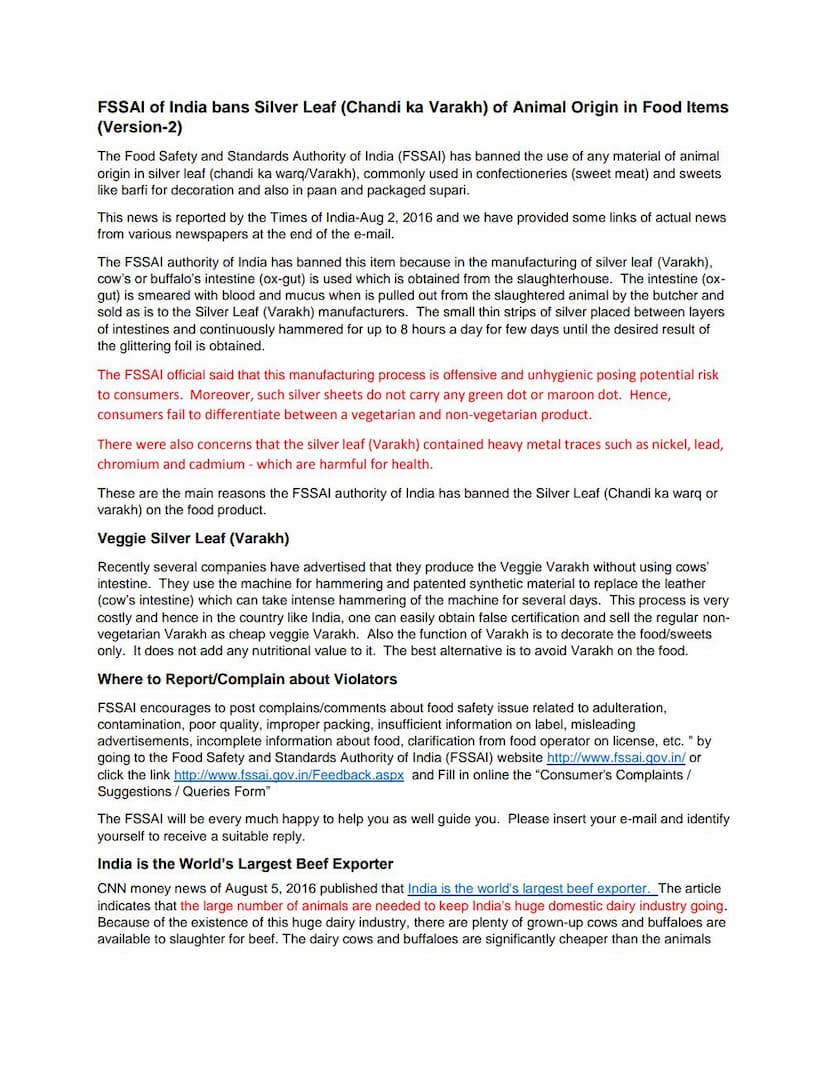India Bans Silver Leaf Varakh On Food
Added to library: September 1, 2025

Summary
Here's a comprehensive summary of the provided Jain text, "India Bans Silver Leaf Varakh On Food" by Pravin K Shah, published by the JAINA Education Committee:
The document details the Food Safety and Standards Authority of India's (FSSAI) ban on the use of animal-derived materials in the production of silver leaf (Varakh), commonly used for decorating Indian sweets, paan, and supari. This ban, reported in August 2016, was implemented due to the unhygienic and potentially hazardous manufacturing process.
Key reasons for the FSSAI ban:
- Use of Animal Intestines: The traditional method of making Varakh involves using cow or buffalo intestines (ox-gut). These intestines are obtained from slaughterhouses, smeared with blood and mucus, and then used as layers between thin sheets of silver. These layers are then hammered repeatedly for extended periods to create the fine, glittering foil.
- Offensive and Unhygienic Process: The FSSAI official stated that this manufacturing process is offensive and unhygienic, posing potential health risks to consumers.
- Lack of Vegetarian/Non-Vegetarian Identification: The silver leaves produced through this method do not carry the standard vegetarian (green dot) or non-vegetarian (maroon dot) indicators, making it difficult for consumers to distinguish between the two.
- Heavy Metal Contamination Concerns: There were also concerns that Varakh might contain harmful heavy metal traces like nickel, lead, chromium, and cadmium.
The text also discusses the concept of "Veggie Varakh" and broader ethical concerns from a Jain perspective:
- Veggie Varakh and its Limitations: While some companies have advertised "Veggie Varakh" made without cow intestines, using machines and synthetic materials, the author expresses skepticism. He suggests that in India, obtaining false certifications is easy, and non-vegetarian Varakh might be sold as vegetarian due to the high cost of the alternative production method.
- No Nutritional Value: The document emphasizes that Varakh serves only a decorative purpose and adds no nutritional value to food, advocating for its avoidance altogether.
- Jain Ethical Concerns Regarding Dairy Products: The author, Pravin K Shah, draws a parallel between the animal origin of traditional Varakh and the ethical implications of dairy consumption for Jains and vegetarian Hindus.
- Beef Export Link: The text cites a CNN report indicating India is the world's largest beef exporter. It argues that the large domestic dairy industry necessitates the slaughter of cows and buffaloes at around five years of age (after their prime milk-producing years) to support the beef export industry. Therefore, consuming milk and dairy products indirectly supports this practice.
- Theft from Baby Animals: The author contends that any milk consumed is "stolen" from mother cows and buffaloes, meant for their calves. He suggests that modern dairy practices, including the use of hormones and genetic modification, force animals to produce excessive milk, leading to premature breakdown of their bodies and subsequent slaughter.
- "Himsak" (Violent) Practices: The document argues that the production of milk, wool, silk, and pearls, like meat and Varakh, is also "Himsak" (violent) due to the suffering and killing of animals involved.
- Call for Religious Re-evaluation: Jains and vegetarian Hindus are urged to ban such "Himsak" items from religious rituals and functions. The JAINA Pathashala Educational books in North America have already implemented this ban for their students.
- Lord Mahavir's Teachings: The text quotes Lord Mahavir's teachings emphasizing the need to practice religion based on the time, place, and environment, and to accept truth from any source.
Reporting Violations:
The document provides instructions on how consumers can report food safety issues, including adulteration, contamination, and misleading information, to the FSSAI through their website.
"The Book of Compassion":
The author mentions his collaboration with Pujya Paramodaben Chitrabhanuji in compiling articles on these themes into a book called "The Book of Compassion," which has also been translated into Gujarati and Hindi. The book covers topics like dairy farm visits, dairy cow suffering, milk's impact, vegetarianism, and alternatives to animal abuse.
In essence, the document highlights a regulatory ban on a traditional food embellishment due to its animal origins and unhygienic production, while also extending this concern to broader ethical and religious considerations regarding animal welfare in practices like dairy farming from a Jain perspective.